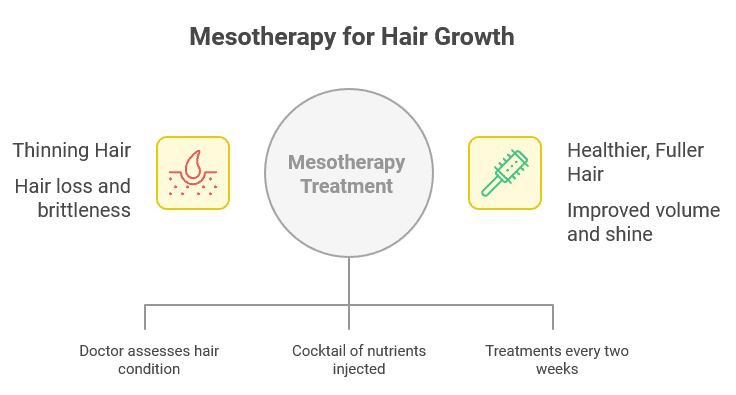If you are experiencing hair loss, there can be several underlying reasons. While it’s usually due to genetics, your lifestyle habits and environment play a big role as well. For example, the harsh chemicals in styling products, hard water, seasonal changes, and aggressive brushing can all leave you with brittle and thinned hair.
The goal of mesotherapy is to help bring the necessary hydration and nutrition to the scalp to stimulate hair growth and add thickness. It is a good way to make each strand more resistant to breakage and give it that lovely natural shine. Let’s go over some of the details on what it is and how it works, as well as what it can and cannot do for you.
What is Hair Mesotherapy?
Simply put, hair mesotherapy is a treatment that applies an essential cocktail of nutrients and growth factors directly to the scalp, nourishing the roots of hair follicles. It’s a safe and effective approach that helps with various issues, including dandruff and split ends, and even stops hair loss.
You can get one or several treatments, which your hair care specialist will determine, and you can expect to see the first positive results after a few weeks. The most common recommendation is to have a session every two weeks over the course of 3–4 months, and then schedule a maintenance visit every three months.
How Hair Mesotherapy Works
The special nutritional cocktail is delivered through superficial injections on the top of the head. It contains minerals, a unique amino acid profile, vitamins, and other compounds that promote hair health.
A single injection typically contains 2–4 or even up to six active ingredients, depending on the desired effects. You can learn more about some of the common ingredients and what they do in the table below:
Ingredient | Main Benefits |
Biotin (B7) | Strengthens follicles and promotes keratin production. |
IGF-1 | Prolongs the growth phase and adds thickness. |
Hyaluronic Acid | Provides deep hydration and elasticity. |
Copper Peptides | Improves blood flow. |
Zinc Gluconate | Regulates oil production. |
Cysteine | Provides shine and minimizes breakage. |
Benefits of Hair Mesotherapy
Once you go through several treatments, you will start to notice improved hair volume and shine. You’ll also have significantly less dandruff and no more split ends. There will also be fewer strands in your brush, as this therapy effectively reduces hair loss, and your scalp won’t get as easily irritated and itchy.
Overall, your hair will look much healthier and fuller after a couple of months of regular sessions, and it will be less prone to breakage during brushing or styling.
Mesotherapy vs. Hair Transplant: Which One Do You Need?
If you have dry, thin hair or any issues with your scalp, like redness and dandruff, it may just be that you need to provide some nourishment for your hair follicles to bring them back to their former glory. Also, if there is only a bit of thinning at the hairline in men or at the crown in women, mesotherapy is a viable solution.
However, if you are in one of the later stages of male or female pattern baldness with lots of thinning on the top of the head, but the hair in other areas is still fairly strong and healthy, then it’s time for a hair transplantation. It’s the only effective treatment for actually promoting hair growth in previously bald areas.
What to Expect Before, During, and After
You will have an initial consultation with the doctor to assess your situation and look at your medical history. They may also check if you are allergic to some of the commonly used compounds. You should avoid caffeine and alcohol for 2–3 days before and after the procedure.
The process itself lasts about half an hour, during which time you will receive several injections.
Some of the side effects you can expect after include redness and swelling at the injection site. You’ll notice less shedding after a few weeks, and denser and shinier hair after about 3–4 months of regular treatment.

Who Should (and Shouldn’t) Get Hair Mesotherapy?
This can be an effective hair loss treatment for those with minimal thinning, stress-related or postpartum shedding, and naturally weak hair or damaged through the use of styling products. You should avoid it while pregnant or breastfeeding, if you have open wounds or an autoimmune disease, have severe balding, or are allergic to any of the ingredients.
FAQs
Does hair mesotherapy hurt?
The doctor will apply a local anaesthetic, so you may feel a light tingling or stinging during and some discomfort for a few hours after the procedure. In general, it is a fairly quick and painless experience, so there is nothing to worry about.
Can mesotherapy replace a hair transplant?
While it may offer reduced hair shedding and add thickness and shine, it is not a substitute for hair surgery, especially for those with a more advanced type of hair loss. It’s best to schedule an appointment with a reputable clinic and discuss all the different treatment options with an experienced professional.
Can I combine mesotherapy with a hair transplant?
It is a good idea to look for supplemental treatments, like mesotherapy and PRP, which are what all the top clinics offer as an addition to the standard hair transplant in Turkey. That way, you can prevent further thinning and keep your results for a long time.

